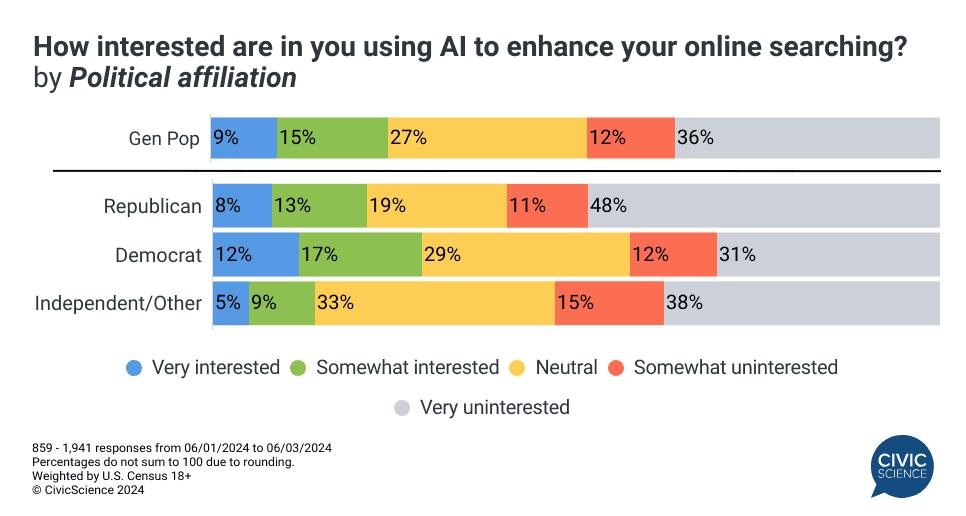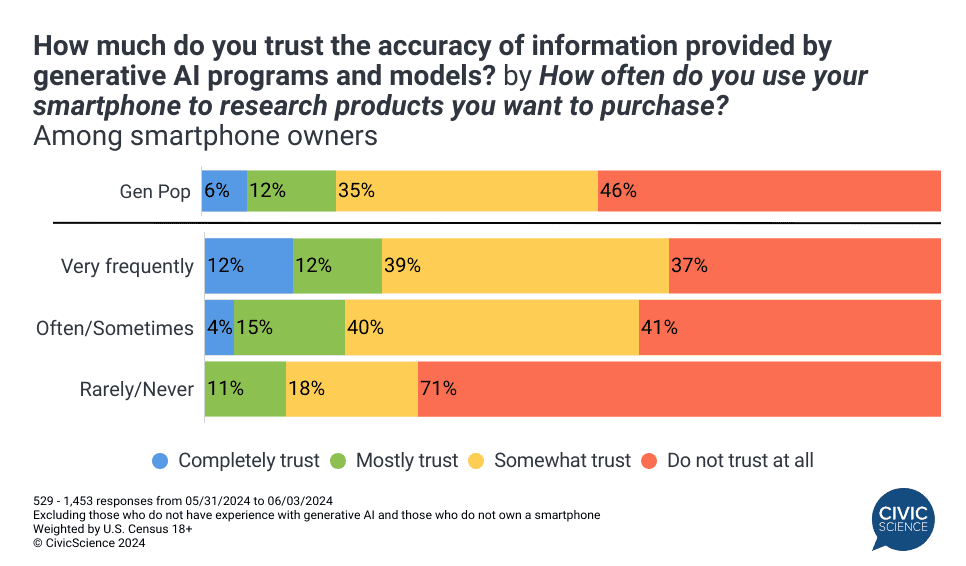As far as AI usage and technology go, we may only be at the tip of the iceberg. There’s the explosion of AI models like ChatGPT, and we’ve seen AI being used to help in healthcare or even as a source of companionship. Search engines have also begun using AI in their own way such as chatbots like Copilot on Bing and Gemini on Google. The latest high-profile example of artificial intelligence usage by search engines comes from Google with its AI Overviews function, which produces AI-generated summaries of search results. The rollout hasn’t come without hiccups, however.
New data from CivicScience reveal Americans are slow to warm to AI web search. They are more likely to be uninterested in AI-assisted online searching than interested — nearly half (48%) report they are uninterested, compared to nearly one-quarter (24%) who would be interested in using AI-enhanced searching.
Democrats hold the strongest level of interest in utilizing AI-supported search (29%), while a majority (59%) of Republicans and Independents (53%) aren’t interested.

Join the Conversation: How do you feel about artificial intelligence (AI) technology overall?
Additional polling from CivicScience reveals that Google dominates as the primary search engine for 72% of consumers, while 8% prefer Bing, 5% use Yahoo!, and 14% choose other search engines.* Google users are the least likely to embrace AI-assisted searching, which makes sense given they have a large representation in the general population. More than a quarter of Yahoo! users, on the other hand, hold some level of interest.
Product research for online shopping adds an interesting dynamic to the mix, especially for those starting on social media. Consumers who begin their research on Instagram are the most open to AI-enhanced search, followed by those on TikTok. However, those who turn to Reddit for product research are less likely to be interested in AI assistance, aligning with recent CivicScience findings that Redditors tend to be wary of AI tools like ChatGPT.

Accuracy issues in information provided by AI tools are certainly not new and are something that consumers are leery about. A majority of those with experience with generative AI technology hold at least some level of trust in the credibility of the information provided, but 46% hold no trust at all, and just 6% say they ‘completely’ trust it. However, trust levels jump significantly among those who frequently use their smartphones to research products they want to buy.

Weigh in: How concerned are you about being deceived by artificial intelligence-generated content?
CivicScience has regularly tracked consumer sentiment around the proliferation of AI and how Americans feel about AI advancement in the next ten years. The latest data run shows that since January, there’s been a six-point increase in those expecting AI to have negative impacts on their quality of life (now 43%) and a three-point decrease in those anticipating positive effects (now 36%)**.
Given this level of concern about the potential adverse effects of AI, search engines may want to proceed cautiously as they consider concepts like AI-enhanced searching with Generative AI. While pairing it with product research to assist online shoppers might prove to be a possible path forward for the technology, will it be enough to overcome skepticism toward AI?
The CivicScience InsightStore database contains over 500k polling questions clients can use to discover how their customers feel about trends like AI. Click here to see it in action and learn how you can leverage this powerful tool.
*n=35,000+ from 10/01/2023-06/03/2024
**n=45,000 from 08/13/2024-06/03/2024








